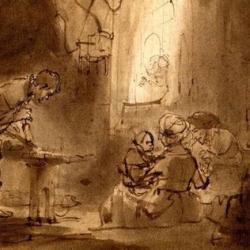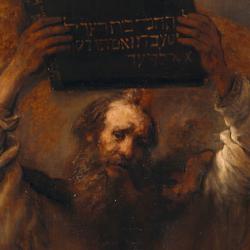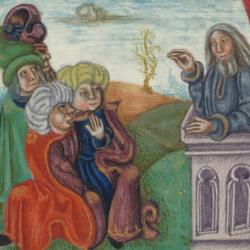Derrida revived the ancient myth of Thoth, told in the Phaedrus, according to which the invention of writing was like a fall of man. Writing things down destroyed the personalism and in-placedness of speech, and eventually would destroy memory.
Being a book, the Bible is understandably pro-book, and the very first reference to writing in Scripture gives us a clue to the significance of written records. After the war with Amalek, Yahweh tells Moses, “Write this as a memorial in a book and set it in the ears of Joshua, that I will utterly blot out the memory of Amalek from under heaven” (Exodus 17:14).
Far from destroying memory, the account of Amalek is written to preserve memory. Records are written because memories fade, witnesses die. And since memory nourishes a the identity of a people, the dying of memory is a step toward the death of the community. A written record isn’t a dead letter, but is the permanent potency to revive memory. As long as the record of Amalek exists, there’s a chance someone will take up, read, and remember.Written records make it possible for a people to survive national destruction; Torah is already a gift that will enable Israel to return from the grave of exile. (Recall – and we can recall only because it is written – the discovery of the law in the temple in the days of Josiah, another brief for the book.)
There’s another side to “memorial” here. Memorials in Scripture are commonly directed toward Yahweh rather than toward Israel (in the first instance). The rainbow is a covenant reminder for the Lord, and the memorial portion of a sacrifice is the portion that ascends to Him. A written record is not only a standing witness to Israel, but a witness to Yahweh. The book of Amalek is a memorial of Yahweh’s determination to blot out Amalek. It’s a memorial of His threat to destroy all memory of Amalek.
The book is given to Joshua to “set in his ears.” That surely means he is supposed to “hear” it by reading or by having it read. The book is a script, a score, for the performer of a reading. Scripture doesn’t set reading and speech in opposition to each other, as Derrida and Plato do. Written records exist to train new generations of speaker-singers.
In the context of Exodus, “set it in his ears” may also carry some other connotations. A permanent slave is bored in his ear lobe (Exodus 21) as a mark that his ear is forever open to his master’s voice; as household servants, priests’ ears are symbolically bored open (Exodus 29): They listen only to the Master of the royal tent. The book seems to have a similar function. It’s an adornment to the ear, set in the ear like a ring of gold; it is given to Joshua so that Joshua can be a permanent servant of Yahweh, so the commands of his Lord can always ring fresh in his ears.
(One could develop a complementary phenomenology by tracing out the import of Deuteronomy 31:19, where Moses writes a song to “put it on their lips” and as “a witness for Me against the sons of Israel.” As Scripture conceives it, the book doesn’t lend itself to a purely mental faith. The book “sets itself” or inscribes the words of the book on the body – the ear and the lip.)














